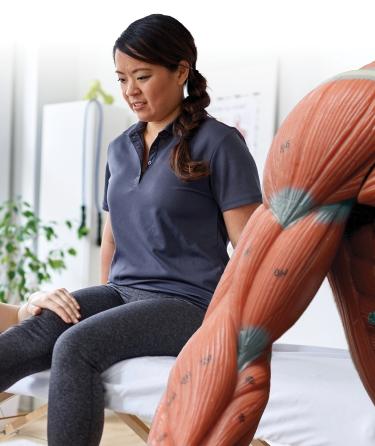KINESIOLOGY MAJOR
Kinesiology Major (KIN MAJOR)
This course is an introduction to the discipline of Kinesiology, physical education and physical activity; and examines human movement from the perspectives of experience, research, and professional practice. Topics include: introduction to kinesiology, spheres of physical activity, motor learning, psychology of sport and exercise, biomechanics, physiology of exercise and the history, sociology, philosophy and pedagogy of physical activity. Discussion also includes becoming a physical activity professional and learning about careers in health, fitness, therapeutic exercise, teaching, coaching and sport management.
This course presents a comprehensive study of the organization and techniques of coaching athletic activities. Topics include facilities, management, budget, coaching techniques, philosophies, and administration.
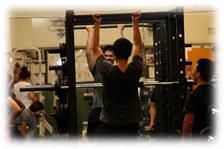
This course addresses a wide range of moral and ethical issues in sports. Topics include values, principles, racial and gender equity, coaching, commercialization, enhancing stimulants and eligibility, violence, sportsmanship and Code of Ethics in sports. Discussions include perspectives on the ethical issues facing athletes today in youth sports, intercollegiate athletics, Olympic sports, and professional sports.
This course provides students with a chronological history, analysis and interpretation of people, events, and issues that affect women in sports. Physiological, sociological, and psychological aspects of female athletes, as related to all areas of sports, are covered. Students gain an understanding of the significant events of women in athletics from the past to the present and how their significance determines the future of women in sports.
This course covers the importance of fitness assessments and how assessment relates to overall program development. Topics include: assessment of cardio-respiratory endurance, body composition fat analysis, evaluation of muscular strength and endurance, evaluating flexibility, measuring heart rate and blood pressure techniques, and evaluation of exercise test results. Additional topics include: risk factor evaluations, development of individual exercise programs, factors influencing exercise programs and the ethics of exercise testing.
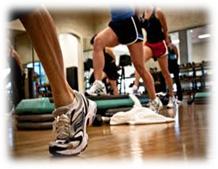
This course provides an introduction to the art and science of group exercise instruction and emphasizes designing and delivery of safe and effective exercise classes. In this course students learn how to teach group exercise classes with the emphasis on how to design a physiologically safe and effective group fitness exercise class which includes: fundamentals of group exercise, primary components of group exercise and group exercise modalities.
This course covers how to teach a variety of strength training techniques and activities to individuals and groups. It studies methods to teaching strength training, equipment, safety factors, principles of strength training, speed and agility training, and basic anatomy and physiology as it applies to strength training. It includes the development of strength training exercises for each body part and program designs.
This course examines how the body functions under conditions of exercise stress. It covers the fundamentals of human movement and anatomy, the practical applications of muscle function, cardio-respiratory testing and functions, principles of exercise, training techniques, energy metabolism, and the effect of environmental conditions on exercise.
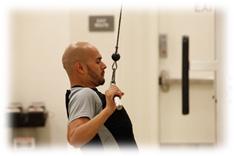
This course is designed to give students the knowledge and understanding necessary to prepare for the Personal Trainer Certification Exam and become effective personal trainers. This is a comprehensive course for designing individualized programs based on each client’s unique health, fitness, and goals. The information covered by this course helps students learn how to facilitate rapport, adherence, self-efficacy and behavior change in clients, as well as design programs that help clients to improve posture, movement, flexibility, balance, core function, cardiorespiratory fitness, and muscular endurance and strength.
This course is designed to present the principles, background, and rationale for current nutrition guidelines specifically for athletes. Using a physiological basis, this course provides an in-depth look at the science behind sport nutrition and students develop an understanding of nutrition as it relates to sport and the influence of nutrition on exercise performance, training and recovery. Areas of focus include; effects of nutrition on training adaptations, weight management and body composition for athletes, recommendations for carbohydrate intake during training, the role of protein in strength and endurance training, how supplements are used in an athlete’s diet, how to balance electrolytes and nutrition for special populations.
This course does not transfer to UC:CSU.
This comprehensive introduction to Physical Therapy Aide course prepares students for the growing field of Physical Therapy. This course is designed to give students the knowledge and understanding necessary for gaining employment as a Physical Therapy Aide in environments such as hospitals, nursing homes, private practices, rehabilitation centers, and sports medicine clinics. Students learn how to prepare treatment areas, transport patients, and complete administrative tasks.
This course teaches the principles, techniques, and ethics used by the athletic trainer in the care and prevention of athletic injuries. The scope of this class includes identification of common athletic injuries, their causes and preventative measures, first aid treatment, and associated follow-up care.
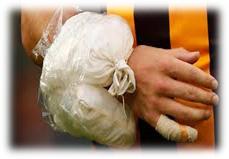
This course teaches advanced understanding and illustration of the care and prevention of athletic injuries. It encompasses advanced aspects of identifying common athletic injuries, emergency treatment, preventive measures, and associated follow-up care using advanced rehabilitation techniques.
This course teaches the principles, techniques, and ethics used by the athletic trainer in the care and prevention of athletic injuries using hands-on experience. The scope of this class includes the ability to prepare game sidelines for safety and efficiency, identify sports-related injuries, and use first aid and primary care for sports-related injuries.
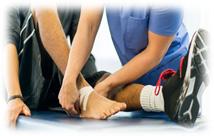
This course provides Kinesiology students a structured internship and opportunity for employment off-campus under the supervision of a faculty member within the Kinesiology Department. Internships enable students to develop an understanding and working knowledge of actual operations, events, planning, and management within the career fields of Kinesiology. The internship experience is an essential component in a student's course of study designed to facilitate the integration of theoretical, applied, and academic subject matter in the field.
This course covers the content of the American Red Cross Lifeguarding program. Students learn how to provide care with the knowledge and skills to prevent, recognize and respond to aquatic emergencies. Lifeguarding includes water rescue skills, first aid, high-quality cardiopulmonary resuscitation (CPR)for breathing and cardiac emergencies, oxygen administration, and use of an automated external defibrillator (AED). Upon successful completion of the course, students receive a Lifeguarding certificate of completion.
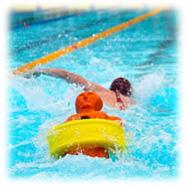
This American Red Cross water safety instructor certification course teaches individuals how to instruct students in all levels of swimming and water safety skills. An American Red Cross-Water Safety Instructor certificate is granted upon the successful course completion and qualifying physical exam.
Announcements
N/A
Upcoming Events
N/A
Quick Links
Contact Information
Location
Dept. Location: E9-112
Contact
Sara Ortiz, Chairperson
Email: @email
Phone: (323) 265-8920
